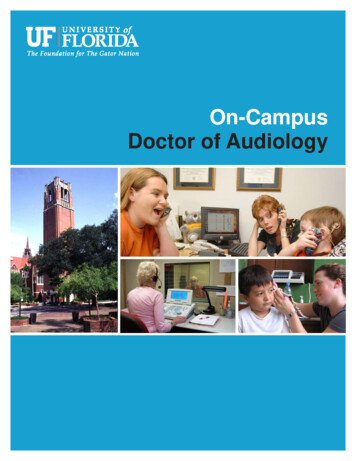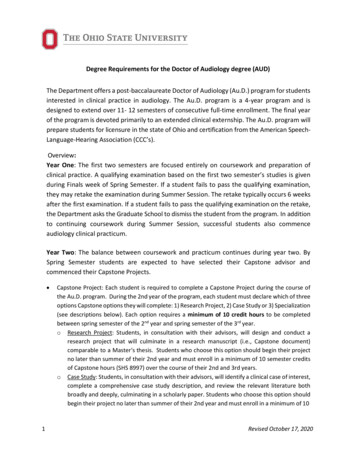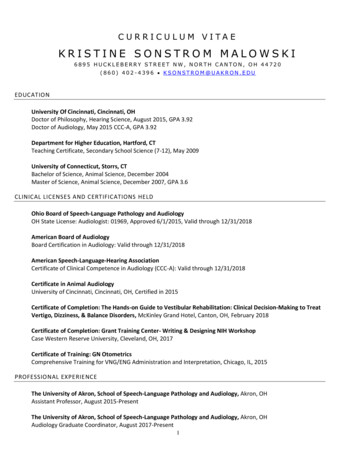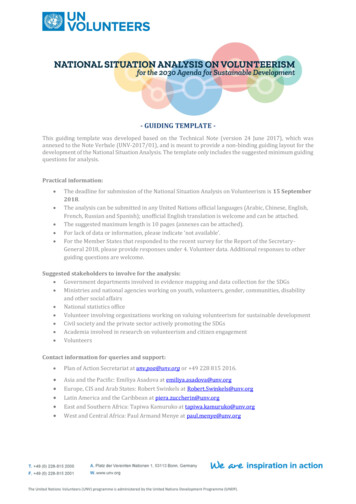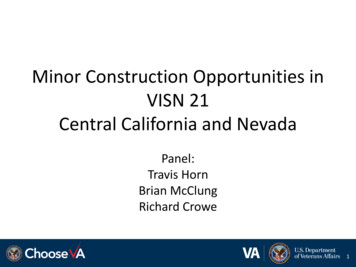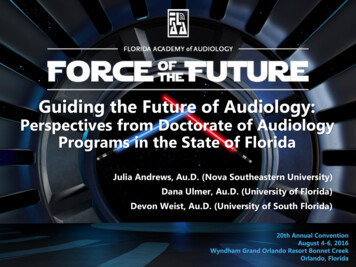
Transcription
Guiding the Future of Audiology:Perspectives from Doctorate of AudiologyPrograms in the State of FloridaJulia Andrews, Au.D. (Nova Southeastern University)Dana Ulmer, Au.D. (University of Florida)Devon Weist, Au.D. (University of South Florida)
Audiology Programs in the State of Florida
Today’s Learning Objectives1. Participants will be able to discuss learning styles oftoday’s doctorate of audiology students.2. Participants will be able to summarize currentstandards needed for universities to maintainaccreditation status.3. Participants will be able to take information from todayback to their clinics and discuss with fellow colleaguesthe possibility of potentially becoming an internshipand/or externship site.
Let’s take a little quiz .
1. Do you have your own web page? (1 point)2. Have you made a web page for someone else? (2 points)3. Do you IM your friends? (-1 point)4. Do you text your friends? (2 points)
5. Do you watch videos on YouTube? (1 point)6. Do you remix video files from the Internet? (2 points)7. Have you paid for and downloaded music from the Internet?(1 point)8. Do you know where to download free (illegal) music from theInternet? (2 points)
9. Do you blog for professional reasons? (1 point)10. Do you blog as a way to keep an online diary? (2 points)11. Do you have an AOL email account? (-1 point)12. Do you communicate with friends on Facebook? (2 points)
13. Do you use email to communicate with your parents?(1 point)14. Did you text to communicate with your parents?(2 points)15. Do you take photos with your phone? (1 point)16. Do you share your photos from your phone with yourfriends? (2 points)
What Generation do you most fit into?0-1 point – Baby Boomer2-6 points – Generation Jones6- 12 points – Generation X12 or over – Generation eration-are-you-part-of-really-take-this-test/
Let me tell you a tale of 6 students
Who are our current students?
Learning styles of today’s studentsYou are special, you are smart, you can do it!Be tolerant and inclusiveIt’s available 24/7!Perform!, Perform!, Perform!Be mindful of others, serve your communityKeep in touch!
How do we teach our current students?
Teaching Tools
Times they are a'changing my friends Technology Commoditization of hearing devices Patient centered healthcare Telehealth Promoting healthy ears
Accreditation of Graduate Programs in Audiology Council on Academic Accreditation (CAA) Established by ASHA but functions autonomously in settingand implementing standards and awarding accreditation Accreditation Commission for Audiology Education(ACAE) Established in 2003 by representative members of theAmerican Academy of Audiology (AAA) and the Academyof Dispensing Audiologists (ADA) Board has evolved so that it is no longer required to havemembers from these organizations but may have liaisons
Accreditation of Graduate Programs in Audiology Purpose of accreditation is to recognize, reinforce,and promote high quality performance in Doctor ofAudiology educational programs through rigorousverification and credentialing processes (ACAE) Establishes, maintains, and applies standards toensure the academic quality and continuousimprovement of audiology education while reflectingthe evolving practice of audiology (CAA)
Accreditation Process Approximately 1 year to gather all necessarydocumentation and complete the application Site visit scheduled approximately 6 – 9 months later Approximately 6 months for board review Accreditation takes between 2 and 2 ½ years toachieve
Maintaining Accreditation Annual program reviews must be submitted Any substantive program changes must be reported Re-accreditation every 8 years
Accreditation Standards CAA Administrative Structure andGovernance Faculty Curriculum (academic &clinical) for audiology programs Curriculum (academic &clinical) for speech-languagepathology programs Students Assessment Program Resources ACAE Eligibility Institutional and AdministrativeStructure Mission/Goals/Objectives –Planning and EvaluationStandards Curricular Standards Faculty (Didactic & Clinical) Health and Safety
Anatomy & PhysiologyMedical AudiologyPractice ManagementUSFResearchAnatomy andPhysiologyClinic Lab I and IIPsychoacousticsElectrophysiologyCochlear ImplantsAmplificationPsychoacousticsAural RehabilitationPediatric AudiologyVestibular searchStatisticsNSUPharmacologyTinnitusAPDGenetics
Clinical Rotations Year 1 UF First year students are assigned to in house clinical rotations one ½ day a week for the firstsemester and 1 full day for the second and summer semesters Required labs and practical exams during first semester to familiarize with equipment andtesting USF Students receive training in clinic labs during fall and spring semesters to familiarize them withequipment, policies, and procedures No clinical rotations In house clinical rotations during the third semester of the first year for 1 1/2 half-days a week NSU Students receive training in diagnostic and amplification labs during fall and spring semesters tofamiliarize them with equipment, policies, and procedures No clinical rotations In house clinical rotations during the third semester of the first year for 2 half-days a week
Clinical Rotations Year 2 UF Second year students are assigned to 1 ½ days of clinicalrotations in the fall semester and 2 days in the spring semester Clinical rotations may be in house, VA, or within the localcommunity USF Second year students are assigned to in house clinical rotationsthe fall and spring of their second year for 1 ½ days per week NSU Second year students continue their in-house clinical rotations at2, half days per week
Clinical Rotations Year 3 UF Third year students are assigned to 2 days of clinical rotations in thefall semester and 2 ½ days in the spring semester Clinical rotations may be in house, VA, or within the local community USF Third year students are assigned to community (greater Tampa BayArea) clinical rotations starting the summer semester and goingthrough the spring of their third year 2 days per week NSU Third year students are assigned to tri-county area clinical rotationsstarting the summer semester and going through the spring of theirthird year 2 days per week
Clinical Rotations Year 4 UF Fourth year students begin their 1 year externship USF Fourth year students begin their 1 year externship NSU Fourth year students begin their 1 year externship
Current Research UF Early development of children with hearing loss Susan Nittrouer, Ph.D. How children learn to understand speech Susan Nittrouer, Ph.D.
Current Research USF Genetic links for presbycusis Dave Eddins, Ph.D. and Ann Eddins, Ph.D. Novel inner ear drug delivery method for the treatment of hearing loss,deafness, and balance disorders Robert Frisna, Ph.D. Development of the first drug globally to advance to Phase II Clinical Trialsfor the treatment of presbycusis Terry Chisolm, Ph.D. and K. Paul Boyev, M.D. Best practices for audiologic interventions to minimize cognitive decline Victoria Sanchez, Ph.D. and Michelle Arnold, Au.D. Effectiveness of cognitive interventions to counter age-related cognitivedecline Jennifer Lister, Ph.D.
Current Research NSU Electrophysiologic evaluation as part of the auditory processingevaluation assessment J. Davie, Ph.D. and S. Wakefield, Au.D. Development and implementation of a competency-based clinical skillsevaluation tool A. Needleman, Ph.D. and E. Friedland, Au.D. Frequency of type I errors in auditory steady state response (ASSR)testing T. Hamill, Ph.D. and L. Lazarus, B.S. Clinical utility of auditory steady state response (ASSR) in children:Correlation in threshold estimation between the ASSR and behavioralassessment A. Needleman, Ph.D.
Preceptor A teacher; aninstructor An expert orspecialist, such as aphysician, who givespractical experienceand training to astudent, especially ofmedicine and nursingAmerican Heritage Dictionary (2011)
Precepting in audiology Audiology programs rely on communitypreceptors to provide hands-on clinicaleducation throughout a student’s education 3rd year semester rotations 4th year externship
AAA externship guidelines Preceptor’s role Patient service Student clinical education Communication with student and university University expected to provide an affiliationagreement Preceptor may hold masters or doctoral degree Minimum of 3 years clinical rch/education/externships
Becoming a preceptor Either a university may contact you and/or youmay contact a university Standardized education now available, not yetmandatory
American Board of Audiology certificate Certificate Holder - Audiology Preceptor (CHAPTM) Training Program Teach preceptors how to facilitate clinicaleducation/experience Create training standards Generate a larger group of skilled preceptors toprovide clinical experiences for audiology ABA.June2016.CHAP-HB.V04.pdf
American Board of Audiology certificate The training program is comprised of 4modules (about 2 hours each) Role of the preceptor in a clinical environmentClinical dynamics – assessment and performanceCreating effective learning programsLegal, ethical and professional ments/ABA.June2016.CHAP-HB.V04.pdf
Perks of externship precepting Giving back to the profession Learning from the student Free CEU opportunities Adjunct faculty Access to current literature
Challenges of externship precepting Balancing responsibility as health care providerand clinical educator Workload increase (at least at first) Providing constructive feedback
Common questions preceptors have Do I need CCC-A to become a preceptor? Do Medicare patients really require 100%supervision? What does that mean?
Why become a preceptor?
Learning styles of today’s studentsinclude incorporating technology,collaboration, and flexibility inkeeping up with a changingprofession All Universities must adhere toregimented guidelines that includeboth didactic and clinical education Being a preceptor shouldn’t be ascary endeavor, instead it shouldbe thought of as shaping the futureof our profession
How to get involved Nova Southeastern University Alyssa Needleman, Ph.D. – aneedleman@nova.edu University of Florida Katherine Gray, Au.D. – katie@phhp.ufl.edu University of South Florida Devon Weist, Au.D. – dlweist@usf.edu
Perspectives from Doctorate of Audiology Programs in the State of Florida Julia Andrews, Au.D. (Nova Southeastern University) Dana Ulmer, Au.D. (University of Florida) Devon Weist, Au.D. (University of South Florida) Audiology Programs in the State of Florida. Today's Learning Objectives 1. Participants will be able to discuss learning styles of




